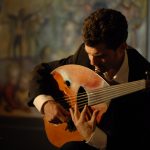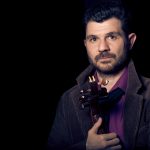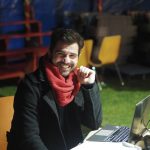With his unique playing technique on one of the oldest stringed instruments of the world, which originates from the ancient time, he leads his listeners into an atmosphere full of inspiration and emotions. His music is described as balm for the soul, which includes old music tradition from Iraq as well as new compositions in old stalk and improvisations (taqsim) on different old Arabic scales.
The Oud is a short-necked lute without frets, which is struck with a pick. One of the earliest images is on a 5000 year old cylinder seal from Mesopotamia. The great musicologist Al Farabi explains this instrument in his writing “Kitab al-Musiqa al-kabira” (the great book of music) in the 10th century C.E. Maqamat, mood and vibrations. With the conquest of North Africa and Spain by the Arabs and the movements of the Crusades, the Oud came to Europe and can be seen as the “grandmother” of the guitar. The word also changed: “Al Oud” (Arabic “the wood”) became Alaude – Laud – Liut – the lute.
Until the 20th century, Arabic music was only passed on orally. European music has a detailed notation that developed over 1000 years and is still developing today. European and Arabic music combined the melodic focus until the 11th century. In Europe, the music then developed to a certain extent “vertically” through the first polyphony to the general bass to complex harmonics in late romanticism and further to atonality. Oriental music remains in the “horizontal” and follows artistically decorated melody lines, which are usually performed in unison. The melody and rhythmic cycles go far beyond our dimensions.
Maqam is a musical style underlying the Near East music and the umbrella term for the tone scales used, which are composed of different tri, tetra or pentachords. Melodic movements and rhythmic structures are carried out according to certain rules. The task of the maqam interpreter is to hit the affect of a maqam particularly well with the voice or on the instrument and to put the audience into this mood with empathy and virtuosity. If maqam music is played instrumentally, the highest goal is to imitate the human voice. Iraqi Maqamusic has over 80 Maqamat, of which only 56 are still in use today.
Taqsim is a rhythmically free improvisation that is usually performed as an introduction as a solo on an instrument (for example, Ney, Oud, Qanun, Kaman / violin and Buzuq). The soloist introduces the audience to the mood of the respective maqam. If a Taqsim succeeds particularly well, the Arabs refer to this as the Tarab and often express their touch with the exclamation “Allah!”.








